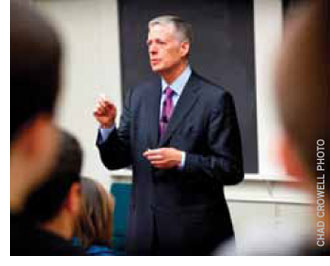
By Jason Togyer
The predecessors of today's Unisys Corp. pioneered some of the most amazing technological breakthroughs of the 20th century--the airplane auto-pilot, radar and microwave communications, and the first American-made commercially available computer, UNIVAC.
But by 2008, when J. Edward Coleman was recruited from Gateway to become Unisys' CEO, the company--in his words--had gone from "king of the hill" to "run of the mill." Structured in the 1980s to take on IBM, 20 years later Unisys was top heavy with management, embroiled in controversies, and losing both money and customers.
In 2009, Unisys turned its first profit in five years and ended 2010 with more cash than debt for the first time in memory. Coleman, who delivered a W.L. Mellon Lecture at CMU's Tepper School of Business in March, told students that the road back to profitability required trimming away layers of management, cutting out expensive perks like corporate jets, creating a better work environment for employees, and improving services for core clients in banking and government. (Unisys, based in eastern Pennsylvania, also has been drastically downsized over the years--from 120,000 employees to about 23,000--and has sold off several divisions.)
One growth area for Unisys has been creating secure government ID programs designed to combat global terrorism and other cross-border criminal activities, Coleman said. And while it continues to support its legacy systems, Unisys is also betting heavily on new cloud-computing technologies for its data-processing clients.
"Profits are up, cash is up, customer service is up," said Coleman, who was hosted by the School of Computer Science and met with several faculty members in computer science and engineering during his visit. "It's so refreshing--two years ago, customers were asking about our problems at Unisys. Now, we're talking about the clients and their problems."
The predecessors of today's Unisys Corp. pioneered some of the most amazing technological breakthroughs of the 20th century--the airplane auto-pilot, radar and microwave communications, and the first American-made commercially available computer, UNIVAC.
But by 2008, when J. Edward Coleman was recruited from Gateway to become Unisys' CEO, the company--in his words--had gone from "king of the hill" to "run of the mill." Structured in the 1980s to take on IBM, 20 years later Unisys was top heavy with management, embroiled in controversies, and losing both money and customers.
In 2009, Unisys turned its first profit in five years and ended 2010 with more cash than debt for the first time in memory. Coleman, who delivered a W.L. Mellon Lecture at CMU's Tepper School of Business in March, told students that the road back to profitability required trimming away layers of management, cutting out expensive perks like corporate jets, creating a better work environment for employees, and improving services for core clients in banking and government. (Unisys, based in eastern Pennsylvania, also has been drastically downsized over the years--from 120,000 employees to about 23,000--and has sold off several divisions.)
One growth area for Unisys has been creating secure government ID programs designed to combat global terrorism and other cross-border criminal activities, Coleman said. And while it continues to support its legacy systems, Unisys is also betting heavily on new cloud-computing technologies for its data-processing clients.
"Profits are up, cash is up, customer service is up," said Coleman, who was hosted by the School of Computer Science and met with several faculty members in computer science and engineering during his visit. "It's so refreshing--two years ago, customers were asking about our problems at Unisys. Now, we're talking about the clients and their problems."
For More Information:
Jason Togyer | 412-268-8721 | jt3y@cs.cmu.edu

